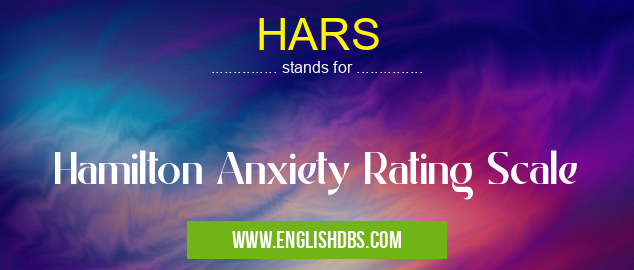What does HARS mean in UNCLASSIFIED
HARS stands for the Hamilton Anxiety Rating Scale. It's a widely recognized and validated scale used to assess the severity of anxiety symptoms in clinical settings and research studies. Developed by Max Hamilton in 1959, the HARS has become a cornerstone in the evaluation and monitoring of anxiety disorders.

HARS meaning in Unclassified in Miscellaneous
HARS mostly used in an acronym Unclassified in Category Miscellaneous that means Hamilton Anxiety Rating Scale
Shorthand: HARS,
Full Form: Hamilton Anxiety Rating Scale
For more information of "Hamilton Anxiety Rating Scale", see the section below.
Key Features of HARS
- Comprehensive: HARS covers a broad range of anxiety-related symptoms, including psychic anxiety, somatic anxiety, depressive symptoms, and behavioral disturbances.
- Quantifiable: Symptoms are rated on a 5-point scale (0-4), allowing for objective assessment and numerical quantification of anxiety severity.
- Subscales: The HARS consists of 14 items grouped into two subscales: psychic anxiety and somatic anxiety. These subscales provide a detailed breakdown of the different dimensions of anxiety.
- Reliability and Validity: The HARS has been extensively studied and found to be highly reliable and valid in assessing anxiety disorders. It's widely used in research and clinical practice for its accuracy and consistency.
Administration and Scoring
HARS is typically administered by a trained clinician through an interview or self-report questionnaire. Each item is rated based on the patient's subjective experience of the symptoms in the past week. Scores for each item are then summed to provide a total score, with higher scores indicating greater anxiety severity.
Interpretation of HARS Scores
- Mild Anxiety: Total scores of 7-13
- Moderate Anxiety: Total scores of 14-20
- Severe Anxiety: Total scores of 21-27
- Extreme Anxiety: Total scores of 28 or higher
Essential Questions and Answers on Hamilton Anxiety Rating Scale in "MISCELLANEOUS»UNFILED"
What is the Hamilton Anxiety Rating Scale (HARS)?
The HARS is a widely used scale for assessing anxiety symptoms in clinical and research settings. It is a structured interview that evaluates 14 specific anxiety symptoms, including psychic anxiety, somatic anxiety, cognitive, and behavioral symptoms.
Who developed the HARS?
The HARS was developed by Dr. Max Hamilton in 1959 as part of his seminal work on the Hamilton Depression Rating Scale (HDRS).
How is the HARS administered?
The HARS is typically administered by a trained clinician or researcher who verbally inquires about the patient's anxiety symptoms over the past week. Patients are asked to rate the severity of each symptom on a 5-point Likert scale.
What is the total score range of the HARS?
The total score range of the HARS is 0-56, with higher scores indicating greater anxiety severity. A score of 0-7 is considered normal, 8-14 is mild anxiety, 15-23 is moderate anxiety, and 24 or higher is severe anxiety.
What are the advantages of using the HARS?
The HARS is a well-validated and reliable tool that provides a comprehensive assessment of anxiety symptoms. It is relatively easy to administer and can be used in a variety of settings.
Are there any limitations of the HARS?
While the HARS is a valuable tool, it does not capture the full range of anxiety symptoms and may not be sensitive to change in all cases. It also relies on subjective patient reporting, which may be influenced by factors such as recall bias.
When is the HARS commonly used?
The HARS is often used in clinical settings to diagnose and monitor anxiety disorders, as well as to evaluate treatment outcomes. It is also used in research studies to investigate the prevalence and correlates of anxiety.
Final Words: HARS is an invaluable tool for healthcare professionals in the assessment and management of anxiety disorders. Its comprehensive coverage of anxiety symptoms, quantifiable scoring system, and strong reliability and validity make it a widely accepted and trusted measure in the field of mental health. By providing clinicians with an objective and standardized method to evaluate anxiety severity, HARS facilitates appropriate diagnosis, treatment planning, and monitoring of patient progress.
